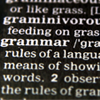Do you have fear about speaking English? Are you afraid to speak English because you might make a mistake? Do you say to yourself and other people "My English is poor" or " I can't speak English." If so, then this column is for you!
[CONTINUE]
Greetings! My name is Sala and I wrote this short article because of the hundreds of students I've taught over the years that have so much fear about speaking English. So much fear that it stops them from learning and speaking as quickly as they could. Does this sound like you?
Look, it's OK to feel fear about speaking English. I think almost everybody has this fear when they are learning. However, I want you to get over this fear , I want you to speak and go for it when speaking English despite your fear. Feel the fear and speak anyway!
Look, you can start speaking English today and feel confident too! It just takes a shift in the way you are thinking and some simple actions. Most importantly, always remember to have fun and enjoy the journey. So, let's get to it!
[Close]
 |
 |
Trust me! Grammar is getting in your way. Thinking too hard about making correct sentences makes speaking like a native English speaker nearly impossible. So just for now I beg you to forget about grammar. Please.
[CONTINUE]
When you were a child learning how to speak Japanese (or whatever your native language might be) did you study grammar before you learned to speak?
How did you learn to speak your native language? By copying your mother, father, siblings, teachers. You heard you mom say something and then you said it. Little by little this is how you learned to speak as a child.
So, why should it be any different when you're learning to speak a second language such as English? Well it shouldn't be any different. The truth is, and I'm sorry to say this, but spending years and years studying grammar does little to help you speak a new language.
You may have a lot of knowledge about English and have done well on your tests in school, but can you actually speak? The truth is that knowing the rules of grammar and being able to speak are very different skills.
That's why I'm advising you to stop focusing on grammar. Just forget about it! Don't think about it, don't worry about it, don't wonder if you said something correctly.
Just speak, that's all I want you to do. Simply speak and if you don't have a large vocabulary yet, that's OK just start speaking with what you know the best you know how.

[Close]
|
 |
 |
OK let me be blunt. If you're not speaking much English because you're worried about making mistakes, then you will love my advice.
[CONTINUE]
My advice to you is make a lot of mistakes! The best way to improve your speaking ability is to speak. When you're learning to speak English you're naturally going to make mistakes. In fact if you are not making mistakes then you're NOT trying hard enough.
That's the truth.
Mistakes are your greatest learning tool.
Mistakes are your friend.
Make mistakes, learn from mistakes, correct mistakes. This is how we learn everything.
Let me give you another example. Do you remember when you learned to ride a bicycle? Did you wait until you knew 100% that you could do it?
I doubt it. I bet you got on that bike and fell down a bunch of times. I bet each try you got better. I bet you scraped your knees and cried a bit, or maybe a lot. But you learned from this what not to do and how to correct yourself until finally one day you could ride your bike without even thinking about it.
What if you never got on that bike until you were 100% sure? I'm guessing you would still be waiting to ride that bike.
Well, this is exactly what I see students do with their English. They are waiting to be perfect before speaking. I see this every single day. So my advice to you is simple: Start speaking. Really, what's the worst thing that could possibly happen? Are you going to get hurt, is somebody going to die? I don't think so. Nothing bad will happen and lots of good can happen.
Ask yourself this question "What is the worst thing that could possibly happen if I start speaking as much as possible and make a lot of mistakes? " Now ask yourself the next question.
"What's the best thing that could possibly happen if I start speaking and make a lot of mistakes?"
I bet the answer will surprise you. Great things will happen if you get out there and take every chance you have to speak English, mistakes and all.

[Close]
|
 |
 |
One of the absolute best ways to accelerate your speaking ability is to make friends with native English speakers. Now depending on where you live this could be easy or it could take some effort.
[CONTINUE]
If you live in an English speaking country, it will be easier of course. If you live in your home country, I assure you there are still ways to make friends with native speakers.
How do you make friends? Well, what are your hobbies, what do you enjoy doing? Do you like to cook, or read books, or exercise, or play soccer? Whatever you like to do I assure you there are clubs, organizations that you can join to meet English speaking people with the same hobbies and interests that you have.
Like I said if you are in an English speaking country then these groups are quite easy to find.
If you are in your native country or a country where English is not widely spoken, then it will take more research. The big cities usually have foreign organizations that provide resources such as clubs and classes for ex-pats or foreigners in that city. These organizations and lessons are often open to local people as well.
If you can't find this or you are in a smaller town, then find a Christian church where foreigners will most likely congregate. See if they have any social activities, classes or resources for their members. Don't worry, you don't have to be a member of the church to go there and talk to someone about their activities or events. Believe me they will welcome you.
You could also ask about doing a language exchange with some of the foreign members of a local church. This is a great way to make new friends and also help out a foreigner in your town that may be struggling with your language.
The idea here is to connect with people that share our interests and you will naturally make friends.
If you still have trouble meeting native English speakers then don't fear. Skype is your next best friend. There are many ways to connect with native English speakers via Skype. There are online English schools and independent teachers that are more than happy to talk with you in English. In fact it's lots of fun and it's easy! You don't even have to leave your home to talk to a native English speaker. It's so convenient.
If you think you'd like to try a Skype lesson but feel a little nervous about how it works or about finding a teacher, feel free to contact us at peters.jp or atlase.net for a free 1hour lesson on Sapporo, Yokohama, Nagoya, Osaka or Skype. It's a great way to see if you like it.

[Close]
|
 |
 |
Yoga, cooking, dancing, singing. This is along the same lines as the last tip where I suggested that you make native English speaking friends. This goes one more step. If you take a class in English, such as cooking, or yoga, or anything you are interested in learning, and you take it in English, you will learn English a lot faster.
[CONTINUE]
The reason why is because you are interested in the subject matter. You are more focused on learning how to learn the task and not so much focused on the English. Thus you are learning something new and learning English is a side benefit.
You think you don't understand enough English to take a class? It's OK . Even if you only understand 10% you will be learning a lot. Also you don't need to understand every word Just try to get the main idea of what the teacher is talking about.
If you don't live in a place where you can take a class. The next best thing is Youtube.com. This will be covered in the next section.

[Close]
|
 |
 |
YouTube is a goldmine for learning English! Do you want to learn how to bake a cake? Go to YouTube and type in the search box "how to bake a cake"
[CONTINUE]
You will get several results with videos and explanations on how to bake a cake. Usually these videos are short and come in a series. This is perfect for learning English. You can repeat the video several times to catch words that you missed. Plus you will learn a new skill.
I used "how to bake a cake" as an example. But it could be anything. Some other examples could be "how to improve my golf swing" or "how to give a great business presentation"
YouTube is such a great learning tool. It is a great secret to learning almost anything! No matter what you want to learn, I promise you there is someone on YouTube that can teach you. Try it out!
The most important tip is to focus on learning another skill that you want to learn and learn how to do it in English.
Go out and buy an English magazine. Do you like fashion" Buy a fashion magazine. Do you like dogs? Go out and buy a dog magazine. Maybe you love traveling then buy a great travel magazine.
Pick an interest that you have and read about it in English. Now the next steps are really important. Pick a short article from the magazine. Read it, but not silently. I want you to read it out loud. Then read it out loud again. I want you to read the article a total of 10 times.
Each time you read it, read it with more confidence. Pretend you are reading it to a group of people and read it. Exaggerate your pronunciation, make up and down sounds remember even if it's incorrect it's OK just do this as an exercise.
This will quickly build your confidence and improve your pronunciation by leaps and bounds! Don't worry if you don't understand all of the content either. Just go for it and read it.
Now if magazines are intimidating to you or feel too difficult then I highly recommend doing this with a children's book. There are some wonderful children's books out there that are short and sweet and great for practicing English.
Another fun thing you can do with magazines is to cut out a picture you like from the magazine. Now take that picture and describe everything in it. Every little detail.
Describe the colors, the people , the location , I want you to put as much description into this as possible. You can even make your own story about the person or people in the photo. This is a great way to have fun and be creative too. It will help expand your ability to describe things in English.

[Close]
|
 |
 |
Are you a music lover? I bet you have a favorite song or musician that you love to listen to a lot. Have you ever had the experience of having a song stuck in your head all day long and you can't get it out of your head?
[CONTINUE]
Well, this is the power of music! Music makes such a strong connection with our minds and our hearts it can be a powerful learning tool, especially for languages such as English.
Music also helps with pronunciation and smoothness of speaking English. Have you ever noticed that English is a musical language? What do I mean by a musical language? It means that English has a lot of up and down sounds just like music does.
Another great point about this is learning to link words together. When you are singing it is natural to connect the words together one after the other, no matter what language you are singing in.
The spoken English language links words together. This is sometimes difficult to do if you are not a native English speaker. If you can sing it though, you can say it too. So singing is great training for English intonation and pronunciation and linking words together.
So, do you have a favorite song you like to sing? Learn the lyrics and sing along. You can easily find the lyrics to your favorite song by going to Google and typing in the search box "name of favorite song + lyrics ".
Even better, go to Karaoke and sing it for your friends. Sing. It's a great secret to sounding like an English speaker!

[Close]
|
 |
 |
Podcasts are a wonderful way to improve listening skills. Even though this is not a way to practice speaking, listening is a way to improve your overall English ability. There are many great resources / podcasts that you can listen to while commuting on the train or doing daily tasks throughout the day.
[CONTINUE]
In a roundabout way listening is a great way to improve speaking. It's like I mentioned in the beginning of this book. The way you learned how to speak your native language was by listening and copying what others were saying around you.
So, if you have limited opportunities to speak, then you can practice speaking by listening Even if you have plenty of opportunities to speak, I still recommend practicing your English through listening.

[Close]
|
 |
 |
I have so many students confess to me that they have no confidence. This is a very common feeling. Chances are you may also have experienced this feeling.
[CONTINUE]
It’s OK if you don't feel confident when speaking English. It's perfectly normal. However, I don't want you to get stuck there. I want you to train yourself to be confident. How do you do this?
You "fake it till you make it". This is a common expression we use when we don't feel quite ready to do something, or don't feel confident doing something. Even if you say things incorrectly if you say it with confidence then it's much more appealing . So smile, make eye contact with whomever you're talking with and speak with confidence. Before you know it you'll really feel confident.
Making positive statements or affirmations to yourself about speaking English is a great way to train your brain that you're a great English speaker.
What is an affirmation? An affirmation is a positive statement you create that trains your brain to think in a new way or to program your subconscious mind to believe something new. So you might create an affirmation that says " I am a great English speaker'' or Speaking English is easy for me"
Whatever you want to be true for you ... make a statement. Write it down on an index card. Now repeat it 10 times out loud every day for at least 21 days.
It takes the brain 21 days to accept a new belief so don't stop . Commit to doing this at least 21 days in a row. Even after 21 days I urge you to continue making the affirmations daily.
Affirmations are scientifically proven to train the subconscious mind. So why not train your subconscious mind to be a great English speaker?
I've had amazing results using affirmations and so have some of my students. You might be surprised at how well this works!

[Close]
|
 |
 |
One of the biggest mistakes I see students make is translating from Japanese to English while speaking. If you speak another native language other than Japanese , this also applies to you too. If you are a native Spanish speaker, Italian speaker or Portuguese speaker it is exactly the same.
[CONTINUE]
I can always tell when someone is translating from their language. Even though the speaking is only in English, it is quite obvious when the person is translating in their head.
Translating is very natural indeed when learning to speak English. However, the sooner you can make the switch from thinking in Japanese or your native language to thinking in English the sooner you will be speaking like a native English speaker.
So how do you go about doing this? It's not as difficult as you might think. It's a little bit like exercise. When you exercise or lift weights you really are training your muscles to become stronger.
The first time you cannot lift much weight. The next time you are a little stronger. Each time you are getting stronger and stronger. However in order to get stronger the weight training has to be consistent. This consistency helps to increase the weight every time and your progress increases.
It's the same with training your brain to think in English. You can start very small, and build up every time you practice. You must be consistent and practice on a regular basis for it to be the most effective.
What I recommend just to get started, is to take just 10 minutes a day to do this simple exercise.
Set a timer for 10 minutes. You will not stop until the bell rings. What you will do is think every thought you think for the next 10 minutes in English and only English.
Start with words instead of sentences if you have to, it’s a great way to get started. For example if it's hard to form sentences then simply look around the room where you are and name everything you can see in English.... "TV" "light" 'ceiling" etc. .
Then when you do this again add information and descriptive words to describe everything you see. Each time you do this add more and more information until you are making sentences in your head about everything you see.
This simple exercise is really about training your " English brain" Try it! It's fun , simple and you'll be amazed at how easily you will begin to think more and more in English.

[Close]
|
 |
 |
This next step is simple but extremely powerful! It's using the power of your imagination to improve your English speaking skills. Just follow these simple steps.
[CONTINUE]
I want you to close your eyes and take a few deep breaths. Get relaxed and let go of any stress you are feeling. Forget about work, forget about the kids, whatever you are worried about let go of it.
Now I want you to imagine yourself in a conversation with someone. Perhaps it's somebody you know or admire, or perhaps it's just someone you're making up in your mind. Either way it's OK.
Next, I want you to imagine yourself speaking English with this person. You are relaxed, confident and having a great conversation. The English is just flowing out of your mouth easily and effortlessly. Wow, it feels so natural, it's so much fun. I want you to feel the feeling of speaking English easily, effortlessly and naturally. As soon as you have this feeling I want you to continue to hold on to this feeling for as long as you can. When you're ready to come out of it, say goodbye to your imaginary friend and slowly open your eyes.
The secret here is that your mind does not know the difference between what is real and what is imagined. This is a proven scientific fact. So if you can create the image and feeling of yourself communicating in English successfully, then your subconscious mind has no choice but to accept it as truth. Your mind will accept this as real and you will really start to act and feel in this way in real life.
Actors, professional athletes, entrepreneurs and many others credit visualization with helping them achieve their goals. So why not you? If they can use it to be successful at what they do, why can't you also use the same technique to become a great English speaker? Well, the good news is that you can! You can do it too!
Try this scientifically proven technique. It works! I also recommend that you do this exercise every day before drifting off to sleep or when you have some relaxation time..
Again, consistency is important here. You can do it.
So, there you go. Atlas’s secrets to speaking English like a native English speaker. I hope you have enjoyed this one, and I sincerely hope you will try some or all of these techniques.
My last bit of advice is simply "Go For It"! Really! You have nothing lose and a whole new world to gain. So shut your textbook, have fun and simply speak!
If you have any comments or questions I would love to hear from you! You may contact us at peters.jp or atlase.net.
I look forward to hearing from you. Thank you for reading, and best of luck on your English speaking journey!
Sincerely,
Atlas Language school by Sala Gibson

[Close]
|
























